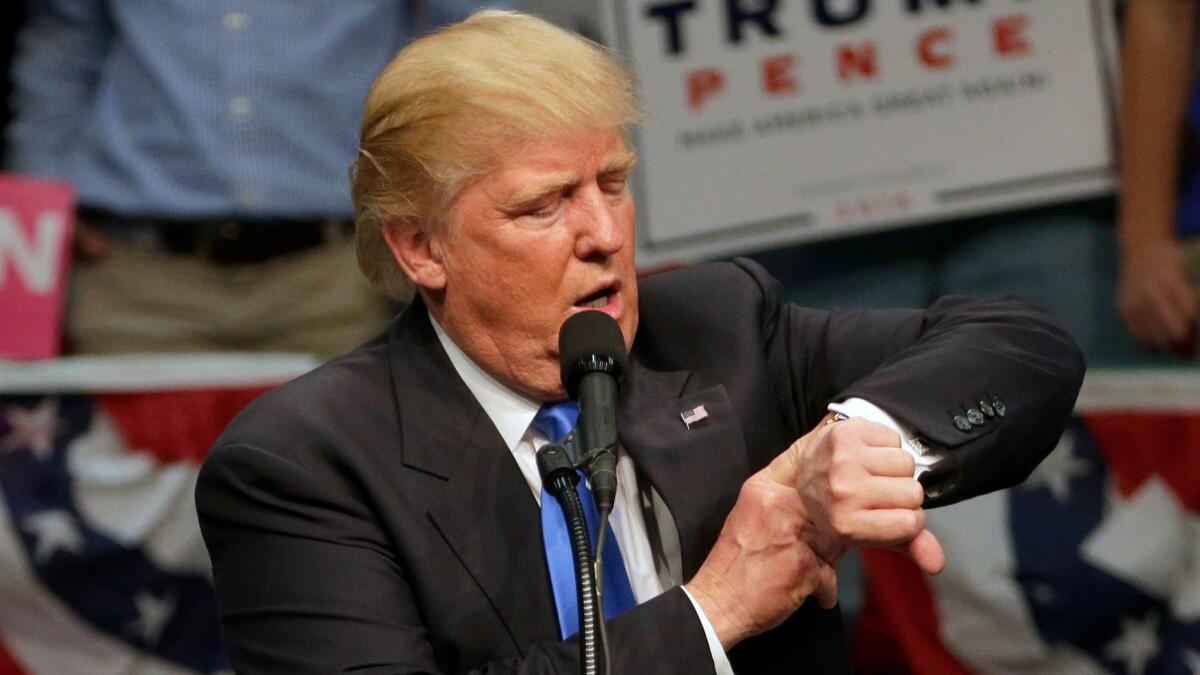Op-Ed: Why Trump’s use of the word ‘stupid’ is not so stupid

- Share via
To those not in his thrall, Donald Trump’s language is puzzling. His speaking style strikes them as “gibberish,” “word salad” and “Palinesque” — Slate’s Katy Waldman compares it to “what you dictate into your Notes app after you’ve downed two Nyquil.” People run reading-level tests on his speeches and announce that he has the vocabulary of a 5th grader.
Yet it obviously works for him. It has helped him build a visceral connection with a group of voters with whom he has almost nothing in common, turning his campaign appearances into mass spectacles that evoke the populist rallies of a century ago, even if no one would mistake him for William Jennings Bryan.
It’s just Trump being Trump. The style he’s been using to forge that connection is the same one that made him who he is. Trump has lived his private life in public for more than 30 years, not as a political figure but as a personality. We’ve always heard him in conversation with someone else — Howard Stern, David Letterman, an “Apprentice” contestant — speaking with an entertaining mix of braggadocio and calculated candor.
He scatters his talk with conversational turn signals like ‘I mean,’ ‘OK?’ and ‘Can you believe that?’
And he’s still conversing now, even while he’s declaiming to a couple thousand listeners. He scatters his talk with conversational turn signals like “I mean,” “OK?” and “Can you believe that?”; he breaks off sentences so his audience can finish them; he abruptly changes the subject when he senses they’re getting restless.
His syntax is conversational, too. The repetitions, the digressions, the sentences that scurry hither and yon — it looks Delphic in print, but so does most conversation when you strip away the pauses, gestures and intonation. The main thing is that listeners hear it as spontaneous and genuine. So what if the line of argument is sometimes lost in the tangles. Non sequiturs aren’t troubling if you already get the point. Like most people who attend political rallies, Trump’s audience came there to connect — they were already convinced.
True, Trump’s vocabulary is restricted. He’s a man of few words, and he repeats them a lot — though not more than most of us when we’re just chewing the fat. But his words aren’t so much simplistic as a pointed departure from the ones we’re used to hearing in public life — especially his choice of insults.
Here’s how Trump explained why he stopped using “incompetent” to describe our leaders: “I know words, I have the best words … but there’s no better word than ‘stupid.’ ” And “stupid” has become one of his signature put-downs, along with “disgusting” and “sad.” Throw in “dummy,” “dopey” and “mental basket case” and he’s impugned the intellectual capacities of Democrats, Republicans, journalists, media organizations, the voters of the state of Iowa, and just about everybody else who has strayed into his field of fire.
He has “stupid” pretty much to himself. Other politicians talk about doing stupid stuff or say that someone was acting stupidly, but they rarely apply the word to their opponents or adversaries. They may call them mendacious, corrupt or subversive, but stupid is off limits.
That’s partly because, coming from a politician, the word sounds mean-spirited and childish. When Iowa Sen. Charles Grassley called President Obama stupid in a tweet a few years ago, Obama’s then advisor David Axelrod suggested that Grassley’s Twitter account must have been hijacked by a 6 year old. Grassley wound up having to walk the remark back.
“Stupid” does have its roots in childhood. It’s the cruelest thing one child can say to another, much worse than “you’re bad” or “you’re mean.” It reduces its target to a nullity. The only response is, “No, you’re the stupid one.” The critic Avital Ronell calls it the ur-curse; it’s the first word we’re forbidden to use, before we graduate to more vicious slurs, not to mention our first epithet — “I don’t want to go to your stupid party.”
Most of us learn early on to temper our use of “stupid.” We reserve it for people who suffer from a blind certainty, too vain or too obtuse to see what’s right in front of their noses. That’s what Trump’s implying about the people he calls stupid; what they lack isn’t intellect, but smarts. It confirms what a lot of Trump’s supporters have always thought about the “elites,” whom they suspect, with some cause, of looking down on them — no, they’re the stupid ones.
“Stupid” suggests to Trump’s fans that they share his intelligence and powers of discernment. “They’re stupid” is something you say when you take it for granted that your listeners are oscillating at the same moral frequency that you are. That means a lot coming from someone whom the media have established as a figure of luminous acumen. True, he has his blemishes, but for Trump and his supporters, if being stupid is worse than being bad, then being smart is more important than being good.
Geoffrey Nunberg, a linguist, is a professor in the School of Information at UC Berkeley.
Follow the Opinion section on Twitter @latimesopinion and Facebook
MORE FROM OPINION
It’s time to take a stand against homelessness in Los Angeles
Why even an accused racist murderer like Dylann Roof shouldn’t face the death penalty
The pope (again) disappoints supporters of women being ordained as priests
A cure for the common opinion
Get thought-provoking perspectives with our weekly newsletter.
You may occasionally receive promotional content from the Los Angeles Times.



